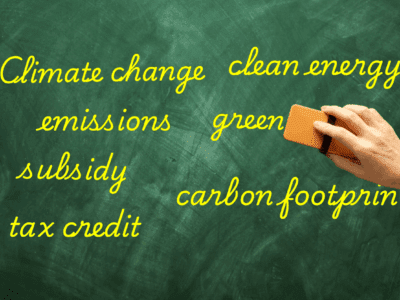The Growing Schism Between Coal and Oil
They’re both fossil fuels, but their producers don’t always have the same policy views.
Bush’s environmental policies were bad, but Trump’s policies are way worse. One reason is that Bush and Cheney were oilman, and Trump is obsessed with coal. Yes, oil and coal are both fossil fuels, but they have different economics and different policy stances.
These are two very different industries. The U.S. coal companies are in desperate economic straits; while the net annual income of major oil companies is measured in the tens of billions. Both stand to be harmed by tighter pollution requirements and efforts to cut carbon emissions. But oil companies are less immediately threatened. It’s going to take a long time for electric vehicles to make a big dent in the global gasoline market. And natural gas has lower carbon emissions than coal, so the major oil companies are happy to see coal pushed out of the electric power market. While oil companies might prefer to have no climate policy, they would rather have a stable policy environment rather than one where environmental policies shift unpredictably.
These differences were on display as Trump was considering withdrawal from the Paris Climate Change Agreement. Exxon Mobil and ConocoPhillips both urged him to stay in the Agreement, as did former Exxon CEO (now Secretary of State) Rex Tillerson. Robert Murray, CEO of the largest U.S. coal company, praised Trump’s “very courageous” decision to withdraw. In contrast, the day before Trump made his announcement, 62% of Exxon shareholders voted to require the company to disclose the potential impact of climate change on its operations.
Last month, we saw the differences between the industries in terms of the reaction to Rick Perry’s demand that the Federal Energy Regulatory Commission (FERC) provide a bailout of coal-fired electricity plants. The coal industry was overjoyed, obviously. I suspected at the time that the proposal was written by coal lobbyists — it reads more like an industry proposal than the product of government lawyers. And in fact, it turns out that the proposal actually was handed to Perry by coal lobbyists. The oil industry opposes the proposal because it would hurt natural gas. The other people who were really unhappy with the proposal were utilities, who have benefited from competitive wholesale markets for electricity.
In fact, paralleling the split between Trump’s pro-coal policies and oil industry preferences is a similar split from the utility industry. The utility industry is diverse, and companies rely on very different mixes of coal, nuclear, gas, hydro, and renewables. In general, they would prefer less environmental regulation, but any particular regulation affects companies in different ways. For that reason, a coal industry lawyer once told me that his clients considered the utility industry’s litigating group to be a very unreliable ally. The need to compromise among different positions means that the positions of utility industry representatives like the Utility Air Resources Group aren’t always to the liking of the coal industry.
After Perry made his coal-bailout proposal, a letter protesting his demand for swift action was filed by a remarkable group including the American Petroleum Institute and associations representing wind, solar, energy efficiency, and rural electricity coops. We may be seeing more of these “strange bedfellow” situations as Trump’s obsessive crusade for coal continues.
Reader Comments
One Reply to “The Growing Schism Between Coal and Oil”
Comments are closed.







No developed European country produces coal in its territory. And the refusal of the US president from the Paris agreement on climate is a shame of the American nation.